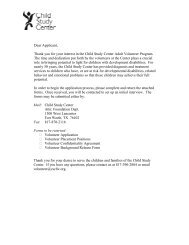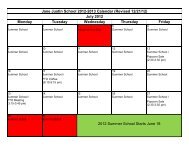to download CSC Application Form - Child Study Center
to download CSC Application Form - Child Study Center
to download CSC Application Form - Child Study Center
- No tags were found...
You also want an ePaper? Increase the reach of your titles
YUMPU automatically turns print PDFs into web optimized ePapers that Google loves.
D3NICHQ Vanderbilt Assessment Scale—PARENT InformantToday’s Date: ___________ <strong>Child</strong>’s Name: _____________________________________________ Date of Birth: _______________Parent’s Name: _____________________________________________ Parent’s Phone Number: _____________________________Directions: Each rating should be considered in the context of what is appropriate for the age of your child.When completing this form, please think about your child’s behaviors in the past 6 months.Is this evaluation based on a time when the child was on medication was not on medication not sure?Symp<strong>to</strong>ms Never Occasionally Often Very Often1. Does not pay attention <strong>to</strong> details or makes careless mistakes 0 1 2 3with, for example, homework2. Has difficulty keeping attention <strong>to</strong> what needs <strong>to</strong> be done 0 1 2 33. Does not seem <strong>to</strong> listen when spoken <strong>to</strong> directly 0 1 2 34. Does not follow through when given directions and fails <strong>to</strong> finish activities 0 1 2 3(not due <strong>to</strong> refusal or failure <strong>to</strong> understand)5. Has difficulty organizing tasks and activities 0 1 2 36. Avoids, dislikes, or does not want <strong>to</strong> start tasks that require ongoing 0 1 2 3mental effort7. Loses things necessary for tasks or activities (<strong>to</strong>ys, assignments, pencils, 0 1 2 3or books)8. Is easily distracted by noises or other stimuli 0 1 2 39. Is forgetful in daily activities 0 1 2 310. Fidgets with hands or feet or squirms in seat 0 1 2 311. Leaves seat when remaining seated is expected 0 1 2 312. Runs about or climbs <strong>to</strong>o much when remaining seated is expected 0 1 2 313. Has difficulty playing or beginning quiet play activities 0 1 2 314. Is “on the go” or often acts as if “driven by a mo<strong>to</strong>r” 0 1 2 315. Talks <strong>to</strong>o much 0 1 2 316. Blurts out answers before questions have been completed 0 1 2 317. Has difficulty waiting his or her turn 0 1 2 318. Interrupts or intrudes in on others’ conversations and/or activities 0 1 2 319. Argues with adults 0 1 2 320. Loses temper 0 1 2 321. Actively defies or refuses <strong>to</strong> go along with adults’ requests or rules 0 1 2 322. Deliberately annoys people 0 1 2 323. Blames others for his or her mistakes or misbehaviors 0 1 2 324. Is <strong>to</strong>uchy or easily annoyed by others 0 1 2 325. Is angry or resentful 0 1 2 326. Is spiteful and wants <strong>to</strong> get even 0 1 2 327. Bullies, threatens, or intimidates others 0 1 2 328. Starts physical fights 0 1 2 329. Lies <strong>to</strong> get out of trouble or <strong>to</strong> avoid obligations (ie, “cons” others) 0 1 2 330. Is truant from school (skips school) without permission 0 1 2 331. Is physically cruel <strong>to</strong> people 0 1 2 332. Has s<strong>to</strong>len things that have value 0 1 2 3The information contained in this publication should not be used as a substitute for themedical care and advice of your pediatrician. There may be variations in treatment thatyour pediatrician may recommend based on individual facts and circumstances.Copyright ©2002 American Academy of Pediatrics and National Initiative for <strong>Child</strong>ren’sHealthcare QualityAdapted from the Vanderbilt Rating Scales developed by Mark L. Wolraich, MD.Revised - 1102HE0350




